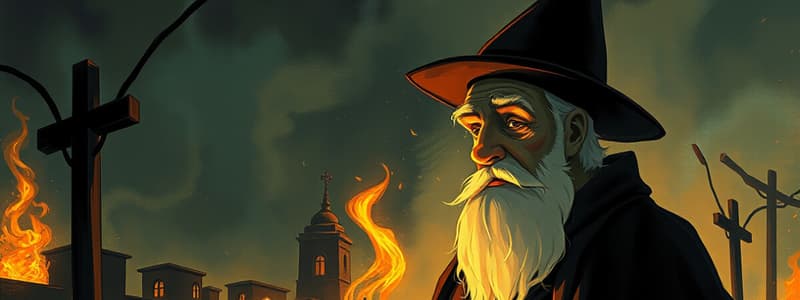Podcast
Questions and Answers
Who is Moshe the Beadle?
Who is Moshe the Beadle?
The caretaker of the synagogue.
What does Wiesel tell the reader of Moshe?
What does Wiesel tell the reader of Moshe?
He is poor and lived in penury; he was the only poor person people liked because he stayed out of the way; awkward and strange.
How does Wiesel describe himself as a boy of 12?
How does Wiesel describe himself as a boy of 12?
Very religious, observant, studied Talmud.
How does Wiesel describe his father?
How does Wiesel describe his father?
Why did Elie's father prohibit him from studying the Kabbalah?
Why did Elie's father prohibit him from studying the Kabbalah?
How did Wiesel realize his wish to study the Kabbalah?
How did Wiesel realize his wish to study the Kabbalah?
What happened to Moshe?
What happened to Moshe?
Several months later, Elie saw Moshe the Beadle again. What story did Moshe tell?
Several months later, Elie saw Moshe the Beadle again. What story did Moshe tell?
How was Moshe able to escape?
How was Moshe able to escape?
How was Moshe changed as a result of his experience?
How was Moshe changed as a result of his experience?
How did other people in the village react to Moshe's story?
How did other people in the village react to Moshe's story?
Why did the villagers react the way they did to Moshe's story?
Why did the villagers react the way they did to Moshe's story?
What was the attitude of the Jews of Sighet?
What was the attitude of the Jews of Sighet?
What literary device does Wiesel employ to emphasize the foolish optimism and denial of facts of the Jews living in Sighet?
What literary device does Wiesel employ to emphasize the foolish optimism and denial of facts of the Jews living in Sighet?
After the Germans arrived in Sighet, what was the prevailing attitude among the residents?
After the Germans arrived in Sighet, what was the prevailing attitude among the residents?
After Passover, Wiesel says 'the curtain rose.' What does this refer to?
After Passover, Wiesel says 'the curtain rose.' What does this refer to?
What happened after Passover?
What happened after Passover?
What was bitterly ironic about the comments that Wiesel's father made regarding the wearing of the yellow star?
What was bitterly ironic about the comments that Wiesel's father made regarding the wearing of the yellow star?
What was the Germans' next step?
What was the Germans' next step?
How did the Jews react to this?
How did the Jews react to this?
The Germans had other plans for the Jews of Sighet. What were those plans?
The Germans had other plans for the Jews of Sighet. What were those plans?
Despite all that happened, even after the Germans entered the capital of Budapest, Wiesel tells us that people still remained optimistic about their future. How can you explain this optimism?
Despite all that happened, even after the Germans entered the capital of Budapest, Wiesel tells us that people still remained optimistic about their future. How can you explain this optimism?
In this chapter, Wiesel uses images from nature. How does he use the sun?
In this chapter, Wiesel uses images from nature. How does he use the sun?
What does the imagery of night suggest?
What does the imagery of night suggest?
Flashcards are hidden until you start studying
Study Notes
Moshe the Beadle
- Caretaker of the synagogue, poor, and well-liked despite his poverty.
- Described as awkward and strange, yet respected within the community.
Elie Wiesel's Early Life
- As a 12-year-old, Wiesel was very religious and observant, focusing on Talmud studies.
- Wiesel’s father was cultured, wise, and held in high regard in the community, while also running a grocery store.
Kabbalah Studies
- Elie’s father forbade him from studying the Kabbalah, stating he was too young and needed to master the Talmud and Torah first.
- Wiesel's wish to study Kabbalah became reality when Moshe agreed to teach him.
Moshe's Deportation and Experience
- Moshe the Beadle was deported with other foreign Jews to Galicia.
- Months later, upon returning, Moshe shared that he had witnessed and survived grave diggings and executions by the Gestapo, returning to warn the community.
Community Response
- The villagers were dismissive of Moshe's horrific tales, unable to fathom the cruel reality he described.
- Optimism prevailed among the Jews of Sighet, showcasing a sense of denial regarding their fate.
German Occupation and Its Effects
- Initial interactions with Germans were reassuring; they appeared friendly.
- Violence and oppression began post-Passover, with the arrest of Jewish leaders and enforced restrictions such as wearing the yellow star.
Ghettoization of Jews
- Jews were divided and moved into ghettos, where they tried to maintain a semblance of normalcy.
- Wiesel’s family was moved to the Small Ghetto, with others sent away to labor camps.
Symbolism and Imagery
- Wiesel employs irony to highlight the confusion and false optimism within the Jewish community.
- The imagery of the sun reflects oppression and brutality, while darkness (night) symbolizes loss of hope and the impending suffering of the Jewish people during the Holocaust.
Overall Context
- The title "Night" foreshadows the loss of optimism and the bleak fate that awaited the Jewish community in Sighet, representing a prolonged period of darkness and despair for the entire Jewish population.
Studying That Suits You
Use AI to generate personalized quizzes and flashcards to suit your learning preferences.




